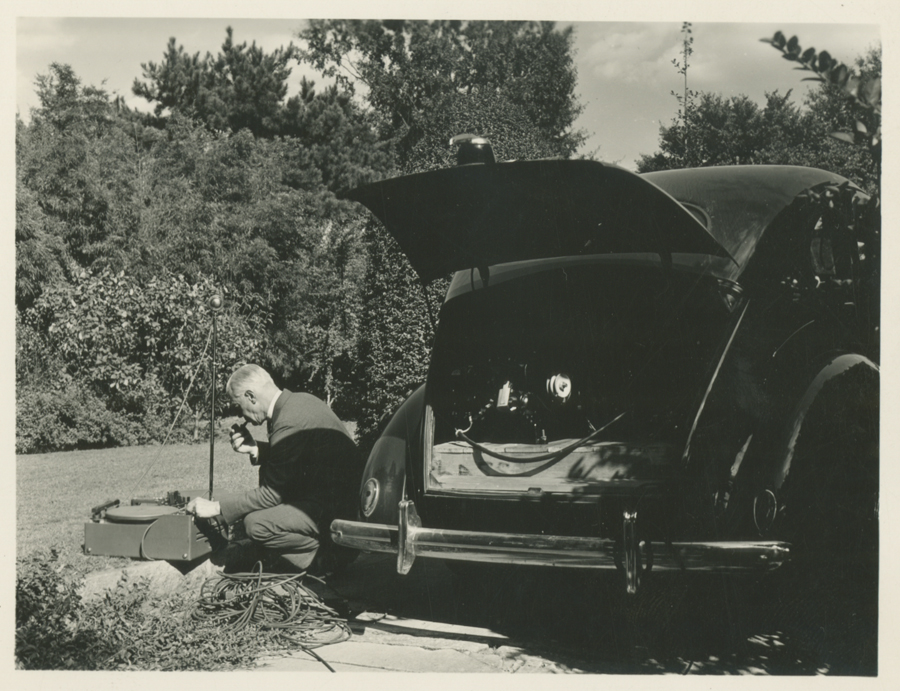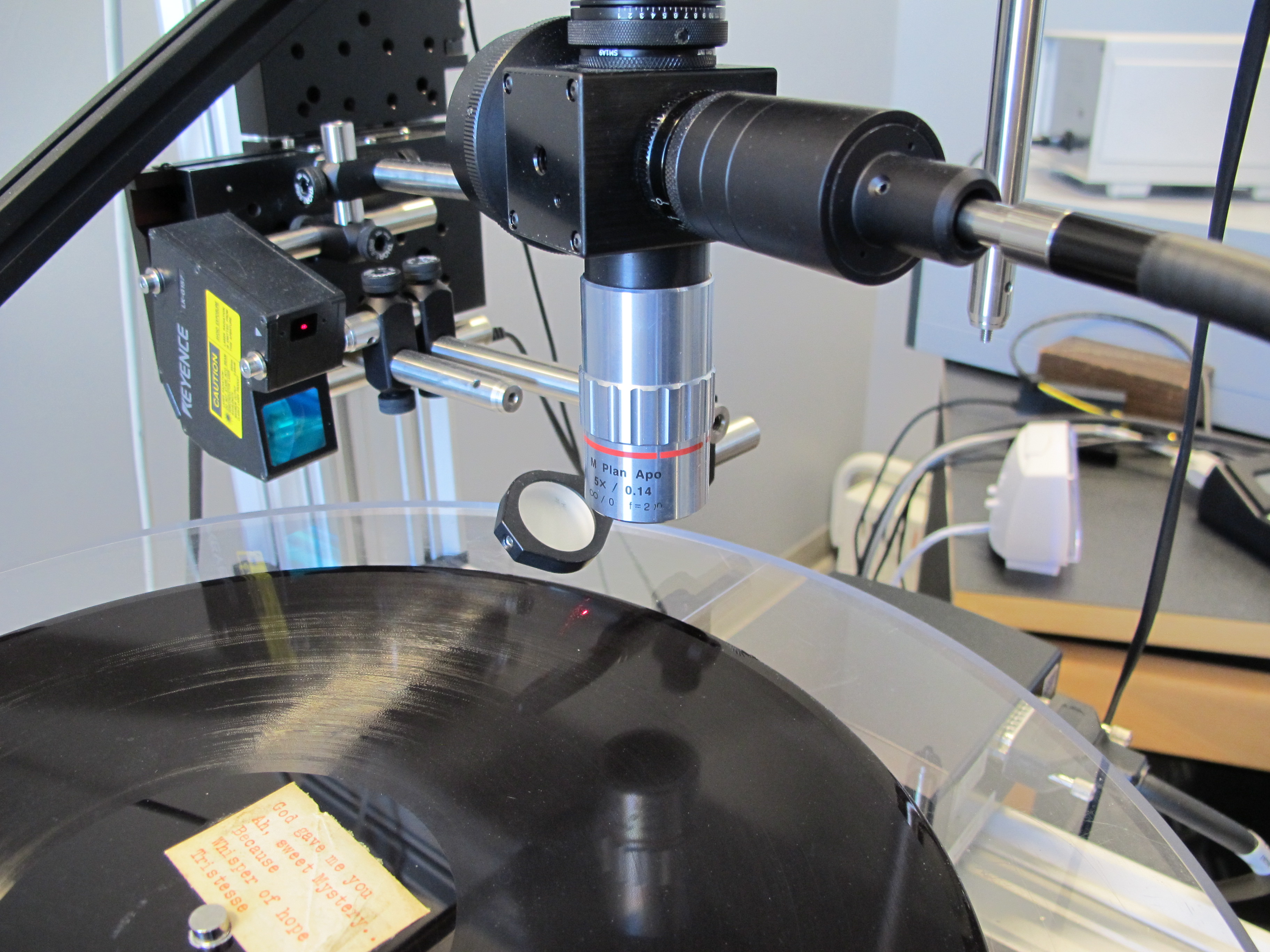Guest post by Winston Atkins, Preservation Officer for the Duke University Libraries and Principal Investigator for the grant to digitize Frank Clyde Brown’s recordings of early twentieth-century folk music.

We are a nation linked by iHeartRadio stations playing “Start Me Up” by the Rolling Stones—that much is certain. I come to understand this as I drive the Frank Clyde Brown Collection’s 60 wax cylinders and 76 aluminum discs of folk songs and ballads to the Northeast Document Conservation Center (NEDCC) in Andover, Massachusetts. There, the NEDCC will use a new and highly innovative technology called IRENE to help us rediscover these performances, which have been essentially unavailable to scholars for nearly a century.
It’s almost too easy to contrast that single, frequently repeated song (unloved by me) with my cargo, but I do it anyway: it’s a 15-hour trip and I’ve got time. The 136 cylinders and discs hold an estimated 1,367 performances collected by Brown as he traveled across North Carolina between 1915 and his death in 1943. Brown, an English professor who also served as comptroller during Trinity College’s transition into Duke University, somehow also found time to drive into back areas throughout North Carolina to record this music. There’s a certain symmetry to me driving his recordings from Duke to Andover.

The wax cylinders are especially brittle, though, which is why Craig Breaden and I finally decided I should drive them to the NEDCC rather than ship them. Craig, the Rubenstein Library’s Audiovisual Archivist, serves as the Project Manager for this grant. We’ve taken special care in packing, and each cylinder is stored in its own box. Twenty cylinders are then housed in a storage box, and for the trip, each storage box is packed in a larger box and surrounded by foam packing peanuts. The single storage box of aluminum discs is packed the same way. Although not as fragile as the wax cylinders, some of the discs use an acetate “lacquer” for the recording medium, which can be damaged.
The care extends to the trip: I’ve rented a minivan, which provides the bonus of a separate air conditioning system for the back storage area. That helps keep the cargo at a uniform temperature—changes in temperature are particularly hard on wax cylinders. In fact, I decide not to eat dinner while the outdoor temperature is above 75 degrees because I don’t want to leave the air conditioning off for too long. I drive to Hartford, Connecticut, that night and when I check into the motel, I take all four boxes into my room, where I put them on the bed instead of on the floor, just in case the fan coil unit leaks. They look kind of cozy there.

What makes the IRENE technology worth the trouble? Craig and I will write more about it over the course of this project, but IRENE is perfect for material like this. IRENE makes ultra-high resolution visual scans of a disc’s or cylinder’s grooves to create an image of the track; its software converts the images to sound files. Creating visual scans first means that we can get an accurate digital sound file without a needle or stylus. That provides two important advantages: we don’t risk further damage to the grooves of these fragile media, and IRENE can sometimes recover sound from cracked or broken discs and cylinders if it can get an image of the grooves sufficient to match up with the other pieces. It’s amazing, and only the NEDCC provides this service.

All of us associated with this project feel like the Brown Collection is a great collection, the music a treasure waiting to be rediscovered. The recordings contain ballads and folk songs that can be traced back to England, songs that traveled to North Carolina from other parts of the United States, and songs like those around the murder of Laura Foster by Tom Dula (a.k.a. Tom Dooley) that originated here.
And that’s what distinguishes this music from the Stones’ “Start Me Up.” Although the same song might be represented several times in the collection, each performance is unique; each musician provided his or her own take on the lyrics and music, or of the people from whom he or she learned the music. Even though the title might be the same, each performance potentially offers insights to us about the culture of the musicians’ locale. That is what makes the trip worth it.
The grant to digitize Frank Clyde Brown’s recordings is part of the Council on Library and Information Resources’ Digitizing Hidden Special Collections and Archives awards program, a national competition that funds the digitization of rare and unique content held by libraries and cultural memory institutions and that would otherwise be unavailable to the public. The Council on Library and Information Resources is an independent, nonprofit organization that forges strategies to enhance research, teaching, and learning environments in collaboration with libraries, cultural institutions, and communities of higher learning.
The program receives generous support from The Andrew W. Mellon Foundation. Founded in 1969, the Andrew W. Mellon Foundation endeavors to strengthen, promote, and, where necessary, defend the contributions of the humanities and the arts to human flourishing and to the well-being of diverse and democratic societies by supporting exemplary institutions of higher education and culture as they renew and provide access to an invaluable heritage of ambitious, path-breaking work. Additional information is available at mellon.org.

